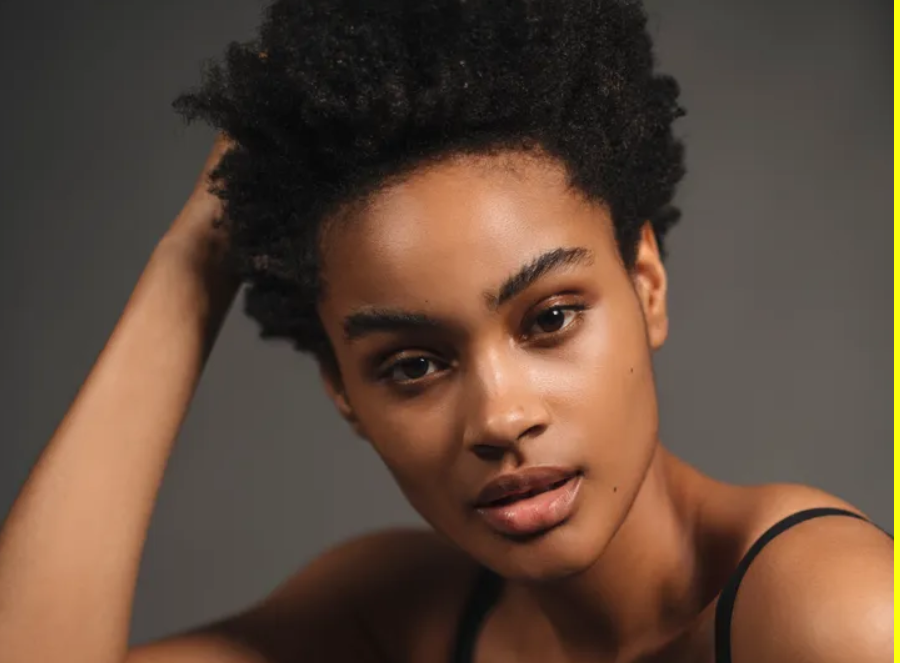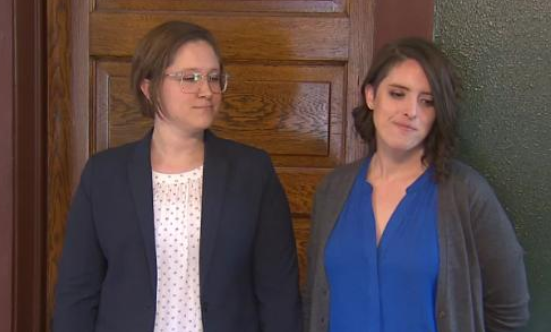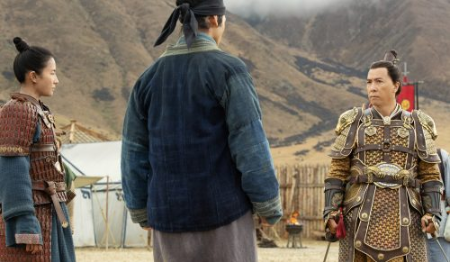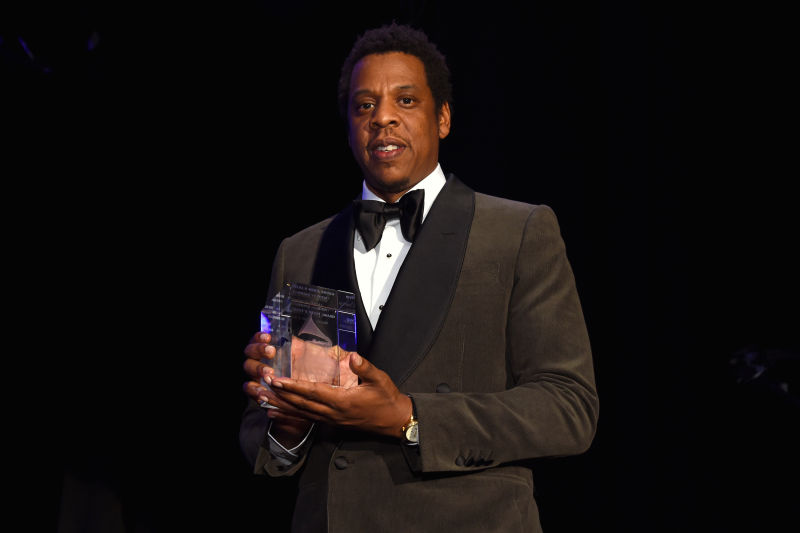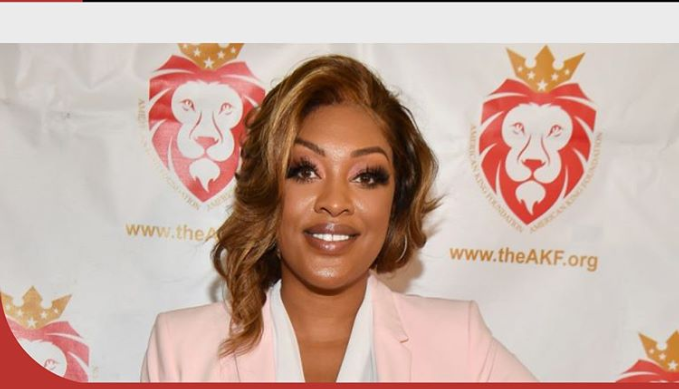I’m A Black Model And This Is What My Hair Goes Through
Jade Williams shares her challenges of having natural hair in the modeling industry
Article via HuffingtonPost
Having natural hair as a Black woman in the modeling industry can help you stand out, but it also comes with challenges. Many hair stylists for photo shoots and runways aren’t trained to work with different hair textures — a dilemma that Jade Williams, a 24-year-old model with JAG Models, is all too familiar with.
Up until she was 18 years old, Williams had always chemically straightened, or relaxed, her hair. But then she decided enough was enough.
“I don’t feel defined by my hair, but it symbolizes me embracing my full self,” Williams said.
Williams spoke to HuffPost about how she embraced her natural hair, the struggles that arise in an industry that isn’t always welcoming of — or trained in — natural beauty, and why she continues to celebrate her look despite these issues.
You embrace your natural hair now, but was that always the case?
In the Black community (more so back in the day), we got our hair chemically straightened from a very young age. When I was 3 or 4 years old, my mother decided to have my hair chemically straightened because my hair was extremely coarse and thick. I would get my hair relaxed every six weeks. Imagine the money spent and damage that has on your scalp over the years! I had many hairstyles with my relaxed hair: razor bobs, blunt bangs, shaggy cuts. I’d been getting that done up until I was about 18 years old.
What was it like getting your hair chemically straightened for that many years?
I’ve experienced chemical reactions, burns and rashes from relaxers, and this is something that is common and a risk people take to have straighter, more manageable hair. This is something that was normalized in the Black community— not so much today, but when I was younger. All for straight hair. This is a direct tie to what we call assimilation in the Black community, where we try to adapt more European standards of beauty.
When did you decide to break from that beauty standard?
I wanted to since I was a younger teen, but I was afraid it would take too much time to do (it takes more time to do natural hair as opposed to chemically straight hair). And I felt that society — or even kids — tease natural hair, especially hair textures like mine where it’s not really a loose curl, it’s a really tight, kinky curl.
Within the Black community, there are the terms “good hair” and “bad hair.” Good hair is usually depicting a Black woman with curly, silky hair. Bad hair would be more kinky, coarse hair like mine. That was something that I was self-conscious about.
But when I graduated from high school and was finally confident enough to express my true self, I decided to stop relaxing my hair. Some people cut all their hair off and start fresh. I was too scared to do that, so I transitioned.
What was that transition like?
After months of not using relaxer, my hair became difficult to style ― I had half an Afro with straight hair at the end. About a year after transitioning, I was invited to a pool party. The thought of me jumping in the pool with my hair like that was terrifying, so I got scissors and got to cutting. That was one of the most liberating moments of my entire life. I went to the pool party, jumped into the pool, and out came me and my voluminous curly Afro. I felt like me, the beautiful Black queen that I was always destined to be. I’m glad I was able to break that cycle and live in my truth.
And does it take more time to wear your hair natural?
People just have the perception of that. It depends on how you want to do your hair naturally. For example, the way I have my hair now is called finger coils. You section your hair into 100 or more sections, and you twist it around your finger to give it an illusion of dreadlocks. That takes about three hours to do.
So let’s talk about modeling. How did you get your start?
I’ve been into modeling since I was a kid. I was always the girl who was just natural in front of the camera: dancer, model, performer. When I was in college, I was freelance modeling and traveling between Washington, D.C., and New York City. I went to Howard University for graphic design. When I graduated, I wanted to really pursue my passion for modeling. So when JAG reached out, it was the perfect opportunity to do it full-fledged. I signed with them last April.
How do you feel your natural hair is viewed in the modeling industry? Has it held you back?
No, I actually feel the complete opposite. When it came to my natural hair, it was actually the thing that put me on the map. The way that I wore my natural hair was very bold. I just let it grow and do its own thing. I let it shape the way that it naturally shaped. I didn’t really try to keep it up too much doing tedious styles — I just let it be.
I do think that it’s very intriguing to clients. People want to capture me and my full essence. However, when I get on some sets, they don’t have the proper team to tend to my hair type, which is sad and unfortunate. So that’s the thing: You have clients that are obsessed with my hair but don’t really invest in people that have knowledge of it.
Is it difficult having people work on your hair who don’t have the proper skills?
I’ve heard comments like, “It feels like I’m knitting when I’m doing your hair,” or, “Keep it wild.” The term “wild” is very offensive because historically, Black people have been compared to animals. When people say things like that, it’s a trigger point in a lot of ways. I’ve had to show a hair stylist how to tend to my hair, and I’ve had a team wanting my hair to be bone straight. If they do straighten my hair, it’s a possibility my hair will not revert back to being curly. It might cause damage, it might break off — and that will, in turn, hinder my opportunities in the future.
Have you ever had someone try to straighten your hair on set?
Yeah, I did have an experience where half my hair was straightened. It was one of my first gigs. We had a time frame and they just thought that the hairstylist should be able to straighten my hair within 45 minutes, and that’s not the case because my hair is very thick. They had to basically try to do a half-straight, half-curly style that turned out horrible. Even though I shared that I was uncomfortable with my hair being straightened, I felt the need to be quiet.
But now I’ve learned that JAG is very supportive of me speaking up about what I would allow when it comes to my hair.
What changes would you like to see in the modeling industry in regards to hair and diversity?
Black hair is something that every team needs to know. You can’t use every product that you find in hair stores. You shouldn’t use hairsprays because it damages our hair ― even certain heat settings and things like that. And I don’t think it’s taught enough to hair stylists on set.
I would also love to see more teams have knowledge of natural hair. Sometimes you’ll see a girl with an Afro or curly hair, and you’ll have other girls in the same job who don’t have that hair type get all these intricate styles. Since the stylist doesn’t know how to do the Afro hair, it’s just left alone. It feels like, “We have no clue what to do with the hair, so we’re going to leave it how it is.”
Do these obstacles ever make you consider changing your hair?
No. Regardless of these obstacles I and other Black women have with our hair, this journey plays a big role in the people that we are today. I’m told my hair makes me “different,” but I think it just makes me me. This is how I was created and happens to be a symbol of my ancestry. In Black culture, we call our hair “crowns” to remind us of who we were before oppression: royalty. My crown defies gravity, my crown is fierce, and my crown is love.
This interview has been edited and condensed for clarity.
Check out some Lovelyti videos:
Dope Beauty Skin & Hair Care Launch Party~ Twin Cities
Benny Harlem (THE Black HAIR Scammer) EXPOSED!! #RECEIPTS ?
Black Twitter GOES OFF on “Shea Moisture” for white-washing their hair products and tv commercials
How to Watch Corey Feldman’s (My) Truth: The Rape of 2 Coreys Documentary
(My) Truth: The Rape of 2 Coreys is finally coming out next month. However, it will not be a traditional release. Corey Feldman announced earlier this week that the long-awaited documentary is seeing the light of day after a series of roadblocks. Feldman has secured the backing he needs to release the documentary the way he sees fit and there are a lot of people waiting to see what he has to say. We have detailed below how you can watch the doc when it comes out next month.
First of all, (My) Truth: The Rape of 2 Coreys will have a live premiere in Hollywood on March 9th. The night marks the eve of the tenth anniversary of Corey Haim’s death. Potential viewers will have to go to Corey Feldman’s MyTruthDoc.com in order to stream the premiere and the movie. The site is currently under construction, but it will be up in time for the tickets to go on sale on February 22nd, 2020.
Tickets prices will be announced on February 18th by Corey Feldman. In his original announcement, the actor/musician says he wants to keep tickets in the $15 – $20 range like a normal movie. With that said, this will not be like a normal movie streaming event. It is, for now, a one night only event, that will take place March 9th at 8PM Pacific. That means East Coasters will have to watch at 11PM. Once the ticket is purchased, viewers will be given a registration code for Truthdoc.com, which will allow whole households to watch the movie for one low price.
Corey Feldman will not be allowing preview screenings or reviews, in order to let (My) Truth: The Rape of 2 Coreys speak for itself. He does not want the media or anyone else twisting his words before the world gets to see his side of the story. Feldman has been taken advantage of in the press in the past and this sadly still happens today. Whatever the case may be, Feldman is ready to get his story out and he’s not charging an arm and a leg to do it.
(My) Truth: The Rape of 2 Coreys was made in order to shed light on what still happens to young actors and actresses in the entertainment industry today. Corey Haim and Corey Feldman have heartbreaking stories, which nobody should ever have to go through. So, hopefully, the release of this documentary will help bring awareness to this issue.
As for whether or not he will be naming the names, that remains to be seen, but he does have 24-hour armed security for himself and his wife. To recap: (My) Truth: The Rape of 2 Coreys will premiere on March 9th at 8PM PTS and 11 EST for a one-night only streaming event that will go worldwide. Tickets will go on sale 2/22/20 on MyTruthdoc.com. You can check out the poster for the movie below, thanks to Corey Feldman’s Twitter account.
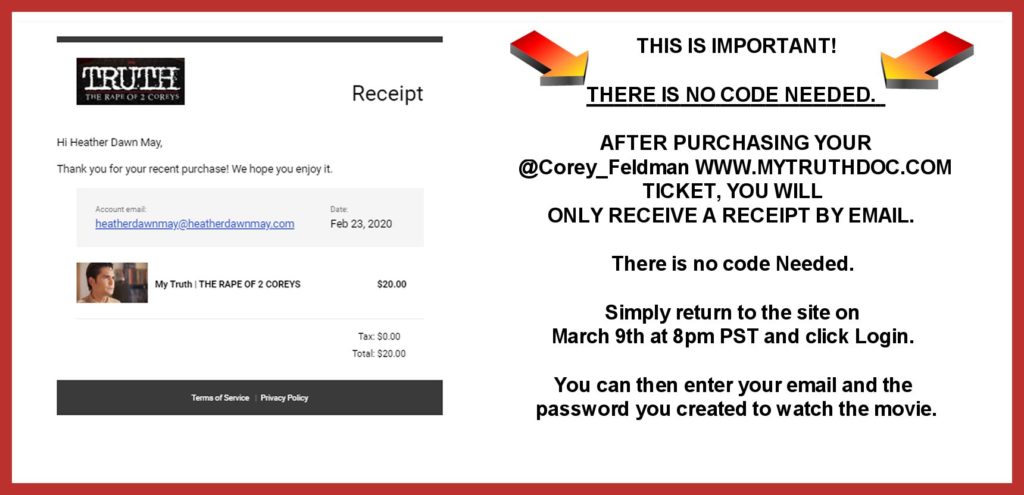
Article via movieweb.com
Check out some Lovelyti videos:
Corey Feldman vows to release names of Several Hollywood Execs+ Corey Haim’s mom speaks out!
Charlie Sheen Accused Of Abusing Corey Haim+Terry Crews Files a police report
Wade Robson found a loophole to sue the Estate of MJ+Aaron Carter threatens Wade #fullbreakdown
Teacher of the year suspended for showing students a picture of her fiancée wins $100,000 settlement
A Texas art teacher who was placed on administrative leave after talking about “her future wife” in class hopes her settlement with a school district will change the lives of other LGBTQ people.
Stacy Bailey, who was on paid leave, reached a $100,000 settlement with the Mansfield Independent School District last week, her attorney said. The district near Fort Worth agreed to remove the eight-month leave from her record, as well as offer mandatory training on LGBTQ issues to human resources and counseling staff in its schools.
The two-time teacher of the year was giving a welcome back to school presentation in August 2017 to her class when she showed a photo of her and her then-fiancee dressed as characters from the movie “Finding Nemo,” according to court documents obtained by CNN. A parent complained to the school, saying that Bailey was “promoting the homosexual agenda,” according to court documents.”
That’s one of the biggest reasons that I did stand up, because I thought if I would have stayed silent or I would have resigned that this would have just happened to someone else after me,” Bailey said Tuesday at a press conference, according to CNN affiliate KTVT.Being able to finally talk about what happened is a relief for Bailey, but it’s also been bittersweet, her attorney Jason C. N. Smith told CNN on Thursday.
“She is glad to finally be able to speak about this,” Smith said. “She’s talked about how she’s a gay teacher, a dedicated gay teacher, and they put her through a lot of pain, but she is hopeful that some of the provisions of the settlement will make Mansfield ISD a more tolerant place for LGBTQ people.”Bailey taught for 10 years at Charlotte Anderson Elementary School in Arlington, Smith said. The teacher was transferred to Lake Ridge High School, which is in the same school district, at the end of the 2018 school year. She is still at Lake Ridge. The district’s school board agreed to the settlement terms on Monday.
“The Mansfield ISD School Board has voted on an agreement to settle the case in question in an amicable and beneficial manner,” Donald Williams, associate superintendent of communications and marketing, said in a statement. “All parties deny any wrongdoing or liability, but wish to resolve their disputes to avoid the time, expense, stress and other impacts of continuing litigation, which would interfere with the mission of educating the students of MISD.”Bailey argued she was discriminated against and her constitutional rights were violated. The school district said the teacher refused to follow administration directions “regarding age-appropriate conversations with students” about sexual orientation.Beyond the mandatory LGBTQ training, optional training will be offered to administrators, staff, teachers or parents who would like to attend, according to settlement documents.
The settlement also requires the school district to provide Bailey with a “neutral” letter of recommendation.
As the Supreme Court is considering cases based on sexual orientation that may affect the district board’s policies, the board of trustees will consider adopting a policy barring discrimination of teachers and students based on sexual orientation within 60 days of the end of the court’s term, the settlement says.”I think this settlement was a win-win for Stacy, the educators and the students of Mansfield ISD,” Smith said. “The judge in this case ruled that gay teachers are protected by the Constitution. That’s a precedent that will protect every gay teacher in this country.”
Smith said that Bailey hopes other teachers will also be more open and be their genuine selves.
“Stacy has encouraged other teachers to live their truth and openly be who they are in the classroom so they can be better people and better teachers,” Smith said.Bailey and her wife, Julie Vazquez, were married in March 2018, Smith said. The couple said they will donate $10,000 of the settlement money to a nonprofit that focuses on LGBTQ issues. Smith said he will donate $10,000 of his reduced legal fees to the Human Rights Campaign, which is the largest LGBTQ advocacy group and political lobbying organization in the US.
Article via CNN
UCLA Gymnast Goes Viral for Incredible Beyoncé Routine 1 Year After Former Teammate Katelyn Ohashi
Nia Dennis is wowing the internet with her sensational floor routine, set to a powerful medley of Beyoncé hits
Move over Beyoncé, the internet is getting in formation for Nia Dennis’ sensational performance.
After the UCLA Bruins gymnast wowed the juges at a NCAA women’s collegiate gymnastics meet last weekend, her floor routine — set to a powerful medley of Beyoncé hit songs — went viral.
The college junior — who has made air-signing her name part of her signature stand-out floor choreography — took things to the next level with her one-of-a-kind Beyoncé mashup.
A homecoming performance that would make @Beyonce proud! @DennisNia made us lose our breath with her 9.975 on floor exercise last weekend in Pauley.
Who else is crazy in love with her routine? ? pic.twitter.com/XE4VvTrZOK
— UCLA Gymnastics (@uclagymnastics) February 28, 2020
Featuring orchestral versions of hits like “Crazy in Love,” “Ego,” and even Destiny Child’s “Lose My Breath,” Dennis commanded the floor, mixing her stunts with some of the Grammy-winner’s famous dance moves.
The gymnast kicked off her routine with a powerful strut across the floor, mimicking Beyoncé’s famous 2018 Coachella stage dancers. As the routine continued — in between round-offs and jumps — Dennis can be seen doing the singer’s signature “Single Ladies” shuffle while incorporating traditional stepping movements.

The 21-year-old —who celebrated her milestone birthday Sunday night — also creatively threw in the dab move and ended her routine by confidently placing an invisible crown on her head.
Dennis earned a 9.975 score out of 10.0 for her routine and was the first of three members of her team to achieve that high score for the Bruins, ESPN reported.
And while the Beyoncé-loving gymnast was just short of a perfect score, her teammate, senior Grace Glenn, made history as the first NCAA gymnast to land a perfect 10.0 as the leadoff member of the UCLA team, according to ESPN.
Dennis and her team’s viral and history-making routines come a year after former teammate Katelyn Ohashi broke the internet with her own perfect 10-scoring floor routine.
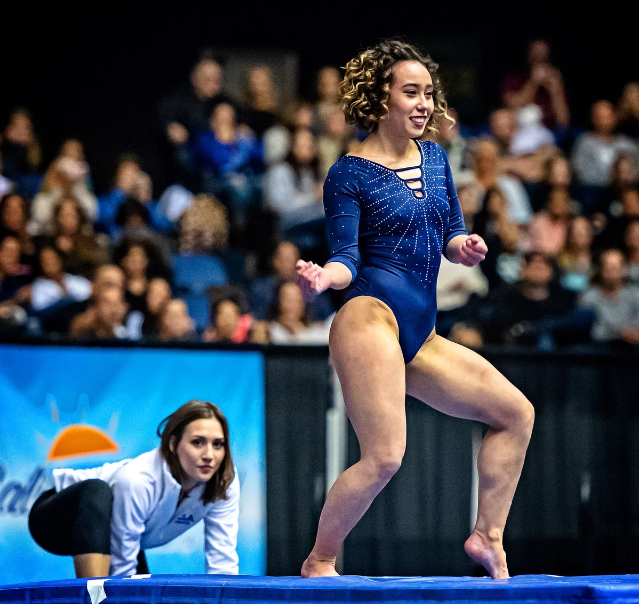
Last January, Ohashi’s electric routine featured impressive passes and flips and was soundtracked by upbeat music like Tina Turner’s “Proud Mary,” Earth, Wind & Fire’s “September,” and The Jackson 5’s “ABC.”
The recent college graduate previously told PEOPLE she knew her routine was going well at the time, but she wasn’t thinking about her score.
“I would have never guessed I have like senators reposting me,” she previously said, referencing the likes of California Senator Kamala Harris. “It’s just crazy and honoring.”
Article via People
‘Mulan’: Why Captain Li Shang Isn’t in the Live-Action Remake
As Disney fans eagerly await the theatrical release of the live-action Mulan, some wonder how this version will hold up compared to the animated classic without its heartthrob Li Shang. When fans noticed Captain Li Shang’s name was absent from the casting notices for Mulan, an avalanche of displeasure made its way across social media, calling the decision “dishonor on you.”
General Li Shang was not only a key character in the animated film, but he stole our hearts with his good looks, sick martial arts skills, a catchy song, and status as a bisexual icon. His character helped drive the story forward, pushing not only Mulan but the rest of his troops to be their best and rise to a massive challenge. We also saw the devastation of war through his experience of losing his father.
Li Shang’s bond with Mulan’s male alter-ego Ping speaks volumes for the LGBTQ community, so why isn’t Li Shang in the movie? According to producer Jason Reed, we’ll actually still have Li Shang in the new Mulan—sort of.
“We split Li Shang into two characters. One became Commander Tung (Donnie Yen) who serves as her surrogate father and mentor in the course of the movie. The other is Honghui (Yoson An) who is [Mulan’s] equal in the squad.”
Reed cites #MeToo movement as an influence on their decision to rework the character.
“I think particularly in the time of the #MeToo movement, having a commanding officer that is also the sexual love interest was very uncomfortable and we didn’t think it was appropriate.”.
This decision removes the power differential, but how will Mulan and Honghui Chen’s dynamic play out? Reed and his team used the animated movie as the model for that level of relationship.
New Zealand actor Yoson An who plays Honghui describes his character as very still, honorable, and observant, and talks about his and Mulan’s initial dynamic.
“They start off on the wrong foot, really. As they progress through the training together, they kind of have this unspoken bond about it because they recognize each other’s warrior spirit. That’s how they kind of build their friendship up to begin with, through the training and acknowledging each other.”
While remaining tight-lipped on the LGBTQ aspect of his character, An talked about how he drew his inspiration for Honghui,
“I see this film as a different variation from the animated version and the original story of The Ballad of Mulan. I kind of took a different angle from Li Shang’s character. I can’t really say to a lot of how that will come across but there is a multi-dimensional layer to him and the audience will be able to see that when they watch the movie.“.
Li Shang will always have a special place in our hearts and we’ll see for ourselves how the dynamic between Mulan and Honghui plays out on March 27th when Mulan hits theaters. Tickets are on sale starting today.
For more of my set visit coverage, check out my rundown of the biggest differences from the animated film and why the characters won’t be breaking out into song.
Article via Collider
Jay-Z files second lawsuit against ‘barbaric’ Mississippi prison
Jay-Z has filed a civil lawsuit against the Mississippi Department of Corrections on behalf of 152 inmates at a state prison, alleging “barbaric” conditions.
Parchman prison is accused of “abhorrent conditions, abuse and constant violence, inadequate health care and mental health care, and overuse of isolation … the people confined at Parchman live a miserable and hopeless existence confronted daily by imminent risk of substantial harm in violation of their rights under the US Constitution”.
Among the problems detailed by the lawsuit and an accompanying documentary film made by Jay-Z’s company Roc Nation are a lack of staffing that has allowed prisoner violence to flourish, sewage-filled cells, contaminated food and water, and a lack of adequate healthcare. Nine inmates have died at the prison so far in 2020.
The suit calls for the Department of Corrections to eliminate health and safety risks within 90 days. The department wouldn’t comment on the suit, but has previously said that violence is gang-related rather than linked to staffing issues.
It is the second lawsuit brought against the prison by Jay-Z, in tandem with fellow rapper Yo Gotti – the pair filed a suit on behalf of 29 other inmates in January.
Jay-Z has frequently involved himself in African American civil rights cases using his philanthropy arm Team Roc, including those of other figures from the rap world. He intervened over 21 Savage’s detainment by immigration officials, and the sentencing of Meek Mill following a probation violation, saying: “What’s happening to Meek Mill is just one example of how our criminal justice system entraps and harasses hundreds of thousands of black people every day.”
He has also reportedly bailed out protesters in Baltimore and Ferguson who were detained during anti-police brutality demonstrations, and has taken on dozens of other cases with civil rights lawyer Alex Spiro.
Article via The Guardian
Check out some Lovelyti videos:
Bryan Michael Cox Says JAY-Z Told Jermaine To Decline His NFL Deal+Faizon love,Rihanna & Nas GO OFF
Shaun King Calls Out Jay Z Over His NFL Partnership: “He’s A Proud Capitalist”
Dame calls Jay Z & Beyoncè COWARDS for NOT defending Rachel Roy or his daughter from the Beyhive??
Angela Stanton is Shocked President Donald Trump Pardoned!
Donald Trump released a long list of surprising pardons this week, from former San Francisco 49ers owner Eddie DeBartolo Jr. to the former New York City police Commissioner Bernard Kerik.
The 11 individuals pardoned included convicted white-collar criminals and the former Illinois governor Rod Blagojevich, who was accused of attempting to sell Barack Obama’s U.S. Senate seat.
House Republicans from Illinois were extremely disappointed in Blavojevich’s commutation, issuing a joint statement that read in part, “We are disappointed by the president’s commutation
of Rod Blagojevich’s federal sentence. We believe he received an
appropriate and fair sentence, which was the low-end of the federal
sentencing guidelines for the gravity of his public corruption
convictions. Blagojevich is the face of public corruption in Illinois.”
There was also one pardon that some did not see coming, Angela Stanton.
In 2007, she served a 6-month home confinement sentence for her role in
a stolen-vehicle ring. Yesterday, she received a presidential pardon
from Trump.
Stanton, who is mentored by Dr. Martin Luther King Jr.’s niece and diehard Trump supporter Alveda King, told conservative site Newsmax ,“I just started hyperventilating right at the airport. I was just crying like a baby. People thought someone had died.”
She continued, “I just had to sit there for a minute to digest it all. I
always said that when I left this world, that would still be on my
record. I just wanted to finally, truly be free. Today, hours before my
birthday, it has happened for me … and I’m still in absolute disbelief,
I’m in shock.”
In Newsmax, King, who is descrived as an “evangelist and
pro-life warrior,” admitted to talking with Trump about Staton. King
claims she told Trump after he signed the pardon, “Wow, you really make
promises, then you keep them.”
Angela Stanton also appeared on TMZ Live and bizarrely criticized
President Barack Obama’s Fair Sentencing Act, claiming that is a reason
why people were “left behind” in prison. The 2010 Fair Sentencing Act was widely praised and reduced the imposition of mandatory minimum
sentences and eliminated the mandatory minimum sentence for simple
possession of crack cocaine.
Article via BET
Angela Stanton SPEAKS OUT after Tokyo Toni threatens to write a tell-all BLASTING Tyga,Future & T.I.
Killer Mike & T.I. VS Candace Owens+Angela Staton is mad that she wasn’t invited to Revolt Summit
Skai Jackson Files Restraining Order Against Bhad Bhabie Over Death Threats
Following their online feud this week, Skai Jackson has filed a restraining order against Bhad Bhabie.
If you missed it, Danielle Bregoli, aka Bhad Bhabie, decided to go at Disney star Skai Jackson earlier this week over her “sneaky” ways online, accusing her of getting intimate with Youngboy Never Broke Again, Lil Gotit, and a few other rappers that she considers friends. While Jackson refuses to comment on the negativity, she’s definitely taking Danielle’s threats at her seriously as she’s reportedly filed a restraining order against the female rapper on Thursday.
TMZ reports that Skai filed the restraining order in Los Angeles Thursday morning, but its clear if the judge has granted it yet.
This report comes just a couple days after the girls’ mothers decided to get into it as well. Skai’s mother responded to Danielle’s comment on Instagram, saying “take this shit somewhere else and leave my damn daughter alone.” Bhad Bhabie’s mother Barbara then decided to come through with her own trash talk, responding, “Oh listen to you preach tell your daughter to stop speaking on mine and you think you are calling my daughter Ratchet. Remember I come from New York too.”
Article via
Check out some Lovelyti videos:
Skai Jackson’s Mother Threatens to Stomp Bhad Bhabie’s Mother out!
Bh@d Bh@bie Calls Out “Bl@ck Females” Who Accuse Her Of Appropriation For Wearing Braids
Underage DISNEY Star Skai Jackson Accused Of Secretly Dating 21yr Old Lil Keed~ Baby Mama GOES OFF!
Author Emma Dabiri is fighting for Afro hair to be protected by the law
Article via DazedDigital
The ‘Don’t Touch My Hair’ author is taking matters into her own hands with a petition to amend the Equality Act
Earlier this month, London student Ruby Williams made headlines when she was awarded an £8,500 settlement in compensation for being repeatedly sent home from school over the course of two years because of her afro hair. A month before, DeAndre Arnold, a senior in Mont Belvieu, Texas, was suspended and banned from attending his high school graduation because of his dreadlocks.
In September 2019, a school in North London reversed its decision to ban cornrows and knotted braids after receiving widespread backlash. In 2018, high school wrestler, Andrew Johnson had his dreadlocks forcibly cut by a referee in order to not forfeit his match. In 2017, Brittany Noble, a news anchor in Mississippi claims she was fired after being told her natural hair was “unprofessional” by her employer.
And these are just the ones that made the news, a few instances of the widespread, global discrimination against black people for wearing their hair in natural styles. While in the UK, the 2010 Equality Act protects against racial discrimination, hair is never explicitly mentioned creating a grey area that allows these prejudices to continue.
To cover similar gaps in US law, the states of California, New York, and New Jersey have all recently passed legislation to specifically protect natural black hairstyles from being discriminated against. Called The CROWN Act, this legislation updated the definition of race used in law to also include “traits historically associated with race, including, but not limited to, hair texture and protective hairstyles.” This prohibits the enforcement of grooming policies in schools and the workplace that discriminate against hair types including bans on afros, dreadlocks, cornrows, braids and other traditionally black hairstyles.
It is particularly important that students are protected from racist grooming policies at school. According to Just For Kids Law, there has been a rise in the number of children being permanently excluded from school in the last few years and this can have serious consequences on their progress. “These children often end up struggling to access the education they need to progress in their lives, and many end up stuck in Pupil Referral Units,” the group state. “These lack the educational standards of mainstream schools, and children there often fall prey to criminal exploitation and get funnelled into a life of crime.’
To combat this and hoping to implement similar amendments as in the US in the UK is Emma Dabiri. The SOAS teaching fellow and author of Don’t Touch My Hair recently started a petition to amend the UK Equality Act to include hair.
Here, we speak to Dabiri to find out why she’s taking matters into her own hands and what you can do to help.
What was the catalyst for starting the petition?
Emma Dabiri: One story too many about the way in which black and mixed children are being penalised by policies that cry neutrality but are categorically and inherently biased. The excuse is often that the rules are applied evenly to everybody so they’re not discriminatory. But that’s not the case. They are rules created by white people for white people. They are designed according to a standard that suits the characteristics of European textured hair.
The phrase that many of the schools use about ‘tied back’ hair, for instance, is so culturally loaded. My hair doesn’t just tie back. If I was going to tie my hair back in a way deemed neat, I would have to straighten it first, or apply a lot of gel and styling products and scrape it back. It’s the equivalent of telling a European person, ‘Just wear your hair in an afro, just wear your hair in cornrows, just wear it in twist outs.’ Also, all the nonsense about nothing shorter than grade two haircuts and the wilful ignorance about the difference between the appearance of a grade two on Caucasian hair in contrast to Afro hair.
Why is it so important for Afro hair to be legally protected?
Emma Dabiri: The Equality Act of 2010 recognises that people need to be legally protected from racial discrimination, race is a protected characteristic and within that skin colour is explicitly mentioned. However, hair texture remains as much a signifier of African heritage as skin colour, and hair discrimination is a specifically anti-black form of racism which needs to be identified by law.
In addition to shaming children for being of African descent and reinforcing the centuries-old narrative that our hair is something to be ashamed of, excluding children from school can have other serious repercussions.
How can people help beyond the petition? What more can be done?
Emma Dabiri: We’re collecting stories around this type of discrimination, particularly school exclusions. The more awareness we have of the frequency that this is happening, the stronger the case we can build. Also, anyone with a relevant skillset that wants to get involved, be that from a legal background with experience of this kind of campaign to a platform they could use to amplify this, holler!
What are the difficulties around getting legislation passed?
Emma Dabiri: A petition is good for raising awareness but the petition itself is only one cog in a wheel. It takes a lot of work to build a campaign to change legislation. Working with lawyers, the support of MPs, a media campaign, it’s a lot!
What change do you hope it will bring? Do you feel optimistic?
Emma Dabiri: My intention is that the biased policing of black hair will be recognised as the discriminatory practice that it is and made illegal. Do I feel optimistic? It’s really really shocking that is something that needs to be fought for in 2020 so given that reality, it’s kind of hard to feel optimistic, but a lot of people are galvanised, now’s really the time to make the change that is desperately needed.


